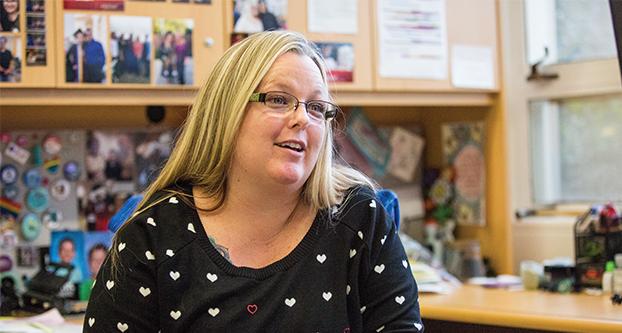Fresno State’s Cross Cultural and Gender Center (CCGC) is asking men on campus to take a stand against sexual assault by participating in the poster campaign, “Men Can Stop Rape.”
The campaign consists of a series of images of men who pledge to advocate for all victims of rape. The posters will be released in April for Sexual Assault Awareness Month.
“Often times when we’re talking about how to stop sexual assault, how to end those types of things, men don’t see themselves as part of the equation,” said Jessica Adams, coordinator of gender programs and services for the center. “They are often feeling blamed or not able to be active. We wanted to reach out specifically to them so they knew there was a place for them to stop this horrendous crime.”
According to the National Sexual Violence Resource Center, 1 in 5 women and 1 in 16 men are sexually assaulted while in college.
For Adams and her student assistant, Jude Jackson, the movement is meant to shed positive light on the collaboration between all men and women towards the cause.
“Some posters [for other campaigns] use images of specifically women in sexually precarious situations. I don’t think that’s beneficial,” Adams said. “I think that’s actually pretty harmful. We’re running a positive campaign that shows men in active roles putting a stop to this.”
Jackson stressed the importance of support beyond the surface of the campaign and hoped his peers will view the campaign as a tool which dismantles the stigma posed on rape victims.
“It gets thrown onto the victim whether it be through victim blaming or it gets thrown onto women as if it’s their burden to take care of it,” Jackson said. “It also disregards the fact that it’s not just women that get raped. People in the trans[gender] community, cis[gender] men, non-binary people are also raped.”
The campaign already has a handful of participants from a variety of communities on campus, including Stefan Alvidrez, a junior majoring in pre-athletic training, who decided to get involved after receiving a Facebook invite from Adams.
“When I saw the event notification, I immediately thought of ‘Take Back the Night,’” Alvidrez said.
“Take Back the Night” is an annual event hosted on campus which promotes awareness of rape and sexual assault.
“Advocating this cause is more than important, it’s necessary, essential and indispensable,” Alvidrez said.
As for the outcome of the campaign, Alvidrez hopes other students will become more knowledgeable and active.
“It still astounds me that I hear conversations on campus where students say things like, ‘We’ll just give [them] a few shots, and they’ll loosen up,’” Alvidrez said. “I think it’s vitally important that students know how to recognize and engage when they are encountered with risky situations where one person is trying to take advantage of another.”
How can female students get involved? Adams encouraged students with experience in this area of activism to share their knowledge and to dispel myths.
“Those little things really matter, and when [others] see that people are paying attention or that their peers are not acting like that, it helps change behavior,” Adams said. “If we don’t address behavior that happens in a climate, nothing is going to change. A poster is not going to matter.”
The “Men Can Stop Rape” campaign will accept participants through February and begin photoshoots in March. Interested participants may sign up in the Cross Cultural and Gender Center in the Thomas Building, Room 110.




